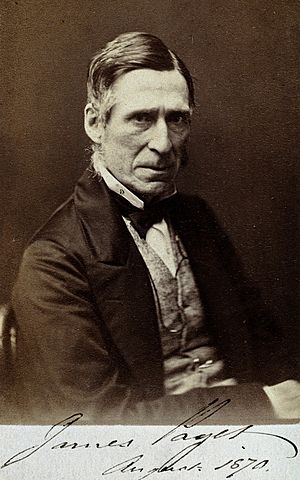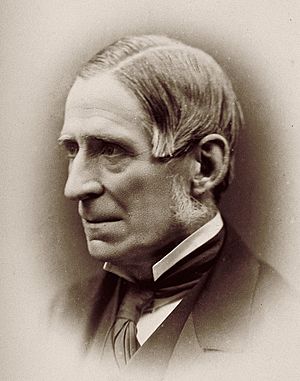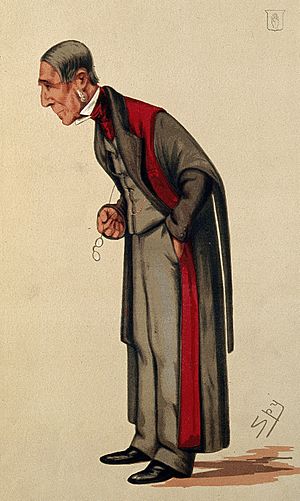James Paget facts for kids
Sir James Paget (born January 11, 1814 – died December 30, 1899) was a famous English surgeon and pathologist. A pathologist is a doctor who studies diseases. He is best known for naming several medical conditions, including Paget's disease of bone. Many people see him, along with Rudolf Virchow, as one of the people who started modern scientific medical pathology.
Some important medical conditions named after him are:
- Paget's disease of bone: This affects bones, making them weak or misshapen.
- Paget–Schroetter disease: This is a rare condition where a blood clot forms in a vein in the arm.
- Paget's abscess: This is an abscess (a pocket of pus) that keeps coming back in the same spot.
His Life Story
James Paget was born in Great Yarmouth, England, on January 11, 1814. His father, Samuel Paget, owned a brewery and ships. James was one of many children. His brother, Sir George Edward Paget, also became a very successful doctor.
When James was 16, he started training with a local doctor. He spent four and a half years learning about medicine. During this time, he also loved studying plants and collected many different types of plants from East Norfolk. He even wrote a book about the natural history of Yarmouth with one of his brothers.
In 1834, James began studying at St Bartholomew's Hospital in London. He was a very dedicated student. He won many prizes in 1835 and 1836. In his first year, he discovered the tiny roundworm that causes trichinosis. This is a parasitic disease that can infect human muscles, often from eating infected pork.
After finishing his exams in 1836, James was qualified to be a doctor. For the next seven years, he was quite poor. He earned very little money from his medical practice. To support himself, he wrote for medical journals. He also helped create lists of items for the hospital museum. He became the curator of the hospital museum in 1836.
In 1843, he became a lecturer at the hospital. He also became the warden of the new hospital college. For eight years, he lived at the hospital, looking after about 30 students. He was very busy, teaching, advising students, and managing the school's money. He often worked for weeks without leaving the hospital.
In 1844, he married Lydia North. In 1847, he became an assistant-surgeon at the hospital. He also became a professor at the Royal College of Surgeons. For six years, he gave lectures on surgical pathology. These lectures were very important and were published in a book called Lectures on Surgical Pathology in 1853. He became a member of the Royal Society in 1851.
James Paget worked hard to pay off his father's business debts, which took him 14 years. He became known as a great expert in how the body works (physiology) and how diseases develop (pathology). He did for pathology in England what Rudolf Virchow did in Germany.
James Paget had several children who also became successful. His sons included Sir John Paget, Bishop Francis Paget, Bishop Luke Paget, and Stephen Paget, who was also a surgeon.
James Paget was friends with famous scientists like Charles Darwin and Thomas Henry Huxley. He was a Christian and believed that religion and science could exist together without problems.
His Important Work
James Paget was a surgeon who based his work deeply in science. He studied a lot about how the body works. He used microscopes constantly to understand diseases. People said he could have been the best expert on the human body in Europe. His lectures helped the St Bartholomew's Hospital school become very successful.
His work in understanding diseases (pathology) was even more important. He used the microscope to study diseases, especially tumours (growths). He also drew pictures of medical samples for a museum. He and Virchow are truly seen as the founders of modern pathology. Their books, Paget's Lectures on Surgical Pathology and Virchow's Cellulär-Pathologie, are very important.
Around 1854, Paget's medical practice became very busy. In 1858, he became a surgeon to Queen Victoria. Later, in 1863, he became a surgeon to Albert Edward, Prince of Wales. For many years, he had one of the busiest surgical practices in London. He often worked 16 or 17 hours a day.
He was especially good at diagnosing and treating tumours and bone diseases. He also discovered Paget's disease of the breast and Paget's disease of bone (also called osteitis deformans), which are named after him. He was one of the first to suggest removing a tumour instead of cutting off a limb in some cases of cancer.
In 1871, he became very ill from an infection he got during a post mortem examination (studying a body after death). Because of this, he had to stop working as a surgeon at the hospital. In the same year, he was given the special title of baronet. He stopped performing operations in 1878, but he continued to advise other doctors for many more years.
He died at his home in London on December 30, 1899, at the age of 85. His son, Stephen Paget, wrote a book about his life and letters in 1901.
Sir James Paget was known for being a great speaker. He enjoyed social events and loved music. He was able to switch quickly from hard work to enjoying his free time. He loved his holidays like a schoolboy and found happiness in simple things. He was a very honorable person with strong religious faith. He believed that science and medical practice should always work together.
See also
 In Spanish: James Paget para niños
In Spanish: James Paget para niños
- James Paget University Hospital
 | Sharif Bey |
 | Hale Woodruff |
 | Richmond Barthé |
 | Purvis Young |




